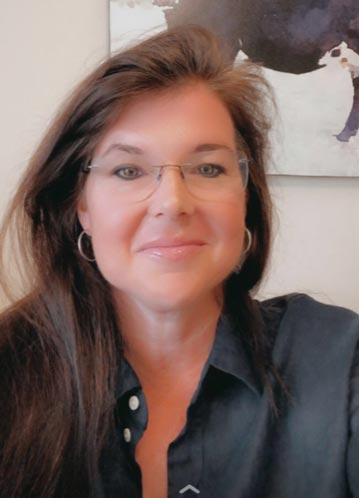I went on to earn a postgraduate certificate in End of Life Studies at Smith College in Northampton, MA and it was during that year-long program that I decided to pursue my PhD at Smith. Upon completing the coursework and writing my dissertation, I began to work as a family therapist at the Austen Riggs Center in Stockbridge, MA, began teaching at Boston College, and also started a private practice.
A few years later, I returned to Houston to be closer to help my family as we rallied around a loved one navigating the perils of having been diagnosed with Early Onset Familial Alzheimer’s. Once in Houston, I served as an instructor at the University of Houston, began working at The Menninger Clinic providing family and individual therapy, and opened a private practice on the side.
In 2014, I committed to my private practice full-time focusing on de-pathologizing people and helping them move away from identifying with the alphabet soup of their diagnoses and move more fully into their lives. In doing so I worked with folks of all ages who grappled with anxiety, depression, grief, challenging life transitions, relationship issues/conflicts, and addiction/codependency.
Unfortunately, in 2016, I incurred a medication reaction/injury from the generic version of the antibiotic Levaquin that impacted my Central Nervous System and ultimately had to take a little time off work. As a result of this injury and subsequent adverse reaction to treatment, I was given a front-row seat in the world of what I now see and refer to as nervous system sensitization. I spent the next several years in a deep dive researching the nervous system which has subsequently led to my approaching the realm of anxiety and anxiety disorders in a fundamentally different way. Eventually, I chose to chronicle my health journey and published the book The Waiting Room, detailing my experience. Around the same time, I started a YouTube channel (jenniferswanphd) devoted to issues regarding nervous system sensitization, medication adverse effects, and withdrawal issues.
Ironically, as I was doing my deep dive into the world of all things nervous system sensitization, I had another life experience emerge that caught my full attention — perimenopause. Remember Kristen Weig freaking out on the plane saying, “There’s something they’re not telling us!” — yep, that was my experience with perimenopause. Once again I was given a front row seat to a show I had no interest in watching, let alone participating in! This led to a few more years of research as well as honing my clinical skills to be of service to myself and others who were suddenly dealing with symptoms such as panic attacks, intrusive thoughts, intense worry, health anxiety, a sense they were losing themselves, loss of confidence, obsessive/looping thinking, apathy, depletion, depersonalization/derealization, doom/gloom and a sense that the eggs were slipping off the platter. As a result of this research, I am currently working on a new book titled, “If You Could See How I Feel: Women, Hormones & Anxiety” due out sometime in 2026.
I now work primarily as a consultant, coach and mentor working both nationally and internationally assisting individuals, couples, families, and organizations to formulate goals and employ strategies, skills, and effective mindset shifts on issues including, but not limited to:
- Anxiety (in all of its various physical, mental and cognitive manifestations) and nervous system sensitization.
- Women experiencing hormone induced anxiety/distress.
- Reframing one’s perspective from “why me” to “what now.”
- Setting appropriate boundaries and limits.
- Navigating life transitions such as divorce, career challenges and loss.
- Building productive relationships through effectual communication and mentalizing. (See video The #1 Ingredient in Relationships under the blog tab.
- Returning to life/work/family after incurring an adverse medication reaction or complicated discontinuation experience.
- Issues that arise in substance abuse recovery such as a need to create healthy perspectives, relational skill building, and developing the tools necessary to move forward without relying on addictive substances.
Mentorship/coaching/consulting, as I see it, is about staying in the here and now, teaching the fundamentals necessary for one to navigate their particular circumstances, and then providing ongoing support and direction as one practices and develops those skills. For example, when I was learning how to play basketball as a kid, if my coach had taught me how to dribble, shoot or pass once or twice and then never showed up again leaving me to master these new skills on my own, I wouldn’t have learned how to be a successful point guard. I needed the ongoing insights, guidance, correction, and support from a trusted coach. My performance improved considerably from having that external motivation and reinforcement on a consistent basis. Later in life, when I first experienced an array of disruptive anxious symptoms as a result of the medication injury, finding an experienced coach who could help me not only develop new skills and strategies but to consistently support me as I made the necessary shifts, was both powerful and life-changing.
In a nutshell, my role is to help people drop bad habits of thought and behavior and to employ new strategies in their lives, one step at a time, over and over; to be courageous enough to take their shots, secure enough to handle the misses and enjoy the makes; and to be accountable for their behavior and actions while stepping out of scarcity and/or victim mentality to reach their goals and highest potential.
In the Fall of 2025, I published my second book titled I May Have Pushed Your Buttons, But I Didn’t Install Them: 52 Pieces of Practical Wisdom to Live and Love Effectively that is available on Amazon and select bookstores. Buttons pulls from my near thirty years of working as a clinician and uses practical techniques and ideas to help build personal resilience and effective relationships. In addition to writing “If You Could See How I Feel”, I am working on the second edition of Buttons as well as a tongue-in cheek coloring and activity book for women navigating the fresh hell of peri/menopause.


